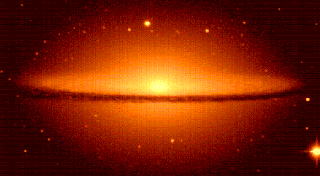
I was listening to NPR the other day, and I heard something that I thought was very intriguing. It must have been on a Friday because it was Ira Flato on NPR Science Friday. Anyway, he was having a conversation with an astronomer about an elementary school teacher who discovered a previously unknown object in space when cataloging galaxies on Galaxy Zoo. Ira inquired about Galaxy Zoo (I couldn't imagine what it was either...) Come to find out, it is a public website that is open to any curious person. http://www.galaxyzoo.org/. The guest astronomer talked about the sheer billions and billions of galaxies in space. Stargazers, amateur and professional, are discovering so many galaxies and other objects in space that astronomers simply can't keep up with even the very basic categorizing of them. As a result, a website was established that allows anyone to experience what astronomers do. It allows someone like me to become an astronomer! I was curious, so I logged on. I have always been interested in astronomy since I was a kid. It was quick and easy to register and set up an account. I made it through the tutorial, took the test, and I am now qualified to categorize galaxies! In a relatively short period of time, a new user can sharpen their "ga laxy identification" skills, take a test to be sure the information is learned, and then relax with a cup of coffee (or Coke!) and look at galaxies in unimaginably far-off corners of the universe. Those who persevere and pass the test, are then able to participate in this massive learning project. The work begins. Participants are asked to look at pictures of real galaxies and place them in specific categories. The website states that an amateur's eye is as good as the trained astronomer's for this task once the eye is tuned in to what to look for. The responses from amateurs on the website go into a database that helps scientists figure out the universe. Some amateur astronomers have made amazing discoveries on Galaxy Zoo by finding things in the photographs that previously were not recognized!
laxy identification" skills, take a test to be sure the information is learned, and then relax with a cup of coffee (or Coke!) and look at galaxies in unimaginably far-off corners of the universe. Those who persevere and pass the test, are then able to participate in this massive learning project. The work begins. Participants are asked to look at pictures of real galaxies and place them in specific categories. The website states that an amateur's eye is as good as the trained astronomer's for this task once the eye is tuned in to what to look for. The responses from amateurs on the website go into a database that helps scientists figure out the universe. Some amateur astronomers have made amazing discoveries on Galaxy Zoo by finding things in the photographs that previously were not recognized!
 laxy identification" skills, take a test to be sure the information is learned, and then relax with a cup of coffee (or Coke!) and look at galaxies in unimaginably far-off corners of the universe. Those who persevere and pass the test, are then able to participate in this massive learning project. The work begins. Participants are asked to look at pictures of real galaxies and place them in specific categories. The website states that an amateur's eye is as good as the trained astronomer's for this task once the eye is tuned in to what to look for. The responses from amateurs on the website go into a database that helps scientists figure out the universe. Some amateur astronomers have made amazing discoveries on Galaxy Zoo by finding things in the photographs that previously were not recognized!
laxy identification" skills, take a test to be sure the information is learned, and then relax with a cup of coffee (or Coke!) and look at galaxies in unimaginably far-off corners of the universe. Those who persevere and pass the test, are then able to participate in this massive learning project. The work begins. Participants are asked to look at pictures of real galaxies and place them in specific categories. The website states that an amateur's eye is as good as the trained astronomer's for this task once the eye is tuned in to what to look for. The responses from amateurs on the website go into a database that helps scientists figure out the universe. Some amateur astronomers have made amazing discoveries on Galaxy Zoo by finding things in the photographs that previously were not recognized! After I got familiar with Galaxy Zoo and tried my hand at being an astronomer, I began thinking about how much I had learned about galaxies. I had so many more questions, and the whole activity was SO engaging. I had fun doing it, and I can tell you now about the different kinds of galaxies. Did you know that spiral galaxies, like our own Milky Way, rotate either in clockwise or counterclockwise direction? You can examine a picture of a spiral galaxy and determine which direction it rotates in. This website and activity could be a really fascinating way for students to get some background knowledge about galaxies and what it is like to be an astronomer. This is a real life task that students could engage in. It is rigorous, and it is relevant. It is application of learning, and could be done cooperatively or independently. It involves technology and being useful. The site provides automatic feedback, and a feeling of accomplishment. It feels like you are making an important contribution. It is highly visual, and forces one to use skills of analysis. There is much to be gained by engaging students in activities that pertain to real life. This one happens to be astronomy. If you know of other websites that have similar value, please take a moment and respond with a short description!
Until next time....

